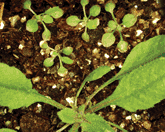
SUC2 mutant’s seed set poses puzzling problems
In the early days of my botanical career, phloem transport of sucrose was a controversial topic. Discussions often became heated; argument and counter-argument were exchanged with some vehemence. The situation is much calmer now. At least three phloem-loading mechanisms have been identified and there is general consensus about sucrose transport in the sieve tubes. Of those phloem-loading mechanisms, that involving the sucrose/protein symporter (the SUC2 protein) is the major one. However, Srivastava et al., at have shown that Arabidopsis thaliana plants with a T-DNA insertion in intron-2 of the SUC-2 gene can still complete their life cycle. Mutant plants contained transcripts of the first two exons of SUC-2 but no functional protein was produced. Indeed, protein produced from the truncated mRNA was unable to catalyse sucrose uptake into yeast cells, again indicating that this mutation (SUC2-4) is a null mutation. Plants harbouring the mutation were extremely stunted and ‘debilitated’ with much smaller cells than wild-type. They took twice as long as wild-type to come into flower, although flowering took place at the same developmental phase as in wild-type. Not all plants produced seed and even in those that did, the number of seeds was only a small fraction of the number produced by wild-type plants. Nevertheless, many of the seeds set on mutant plants were viable (69 % mean percentage germination, c.f. 98 % in wild-type). These results raise several questions. Why have not plants harbouring other mutant alleles of SUC-2 produced seeds? The authors suggest differences in growth conditions as an explanation. How, in the absence of this major sucrose symporter, did the plants achieve any significant growth and, having done so, how did they channel fixed carbon to the developing seed? The authors discuss these questions at some length. I simply comment that perhaps the phloem story is not as clear as I implied earlier.
Professor J. A. Bryant
University of Exeter, UK
j.a.bryant{at}exeter.ac.uk